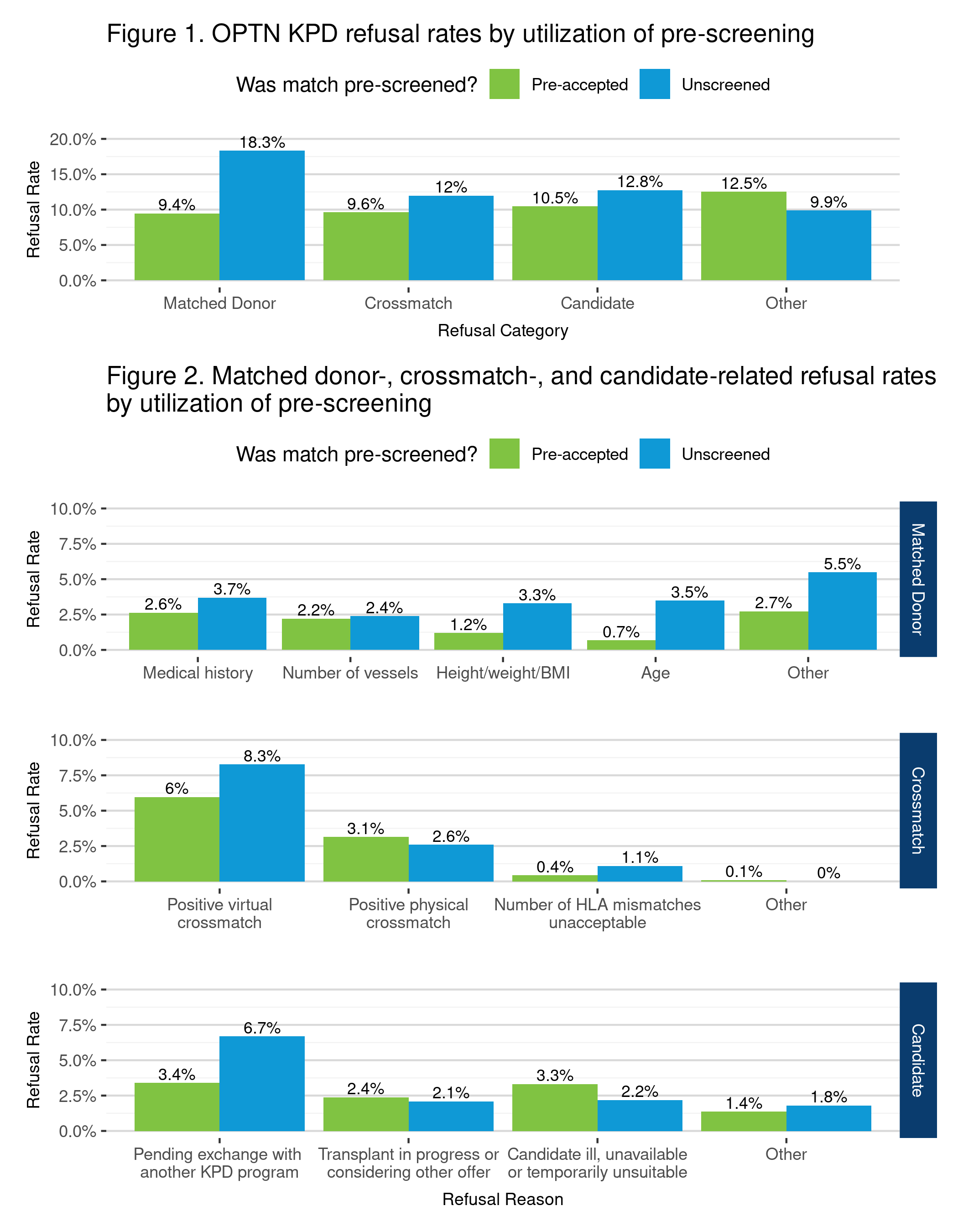Impact of Pre-Screening on OPTN Kidney Paired Donation Pilot Program Transplant and Refusal Rates
1UNOS, Richmond, VA, 2Carnegie Mellon University, Pittsburgh, PA, 3University of Maryland, College Park, MD, 4Beth Israel Deaconess Medical Center, Boston, MA, 5Carolinas Medical Center, Charlotte, NC
Meeting: 2021 American Transplant Congress
Abstract number: 1070
Keywords: Donation, Kidney, Kidney transplantation, Screening
Topic: Clinical Science » Kidney » Kidney Paired Exchange
Session Information
Session Name: Kidney Paired Exchange
Session Type: Poster Abstract
Session Date & Time: None. Available on demand.
Location: Virtual
*Purpose: The OPTN Kidney Paired Donation Pilot Program (KPDPP) donor pre-screen tool allows centers to review and pre-accept or pre-refuse potential donors for individual candidates before match runs. Pre-screening is optional unless the candidate’s CPRA is >=90%. The intent of pre-screening is to improve match quality and reduce match refusals, thereby increasing the number of exchanges that proceed to transplant. Our objective was to assess the impact of pre-screening on transplant and refusal rates.
*Methods: We analyzed OPTN data for all KPDPP match offers from 1/1/15-12/31/19 by utilization of pre-screening. We evaluated matches by whether they were pre-accepted or unscreened; pre-refusing a donor precludes the candidate from matching with that donor during the match run.
*Results: The KPDPP made 2463 match offers during the cohort including 2178 offers to KPD candidates (285 were bridge donors or exchange-ending donors). Of matches to KPD candidates, 1024 (47%) were refused, 948 (43.5%) were accepted but fell through due to a refusal elsewhere in the exchange, and 206 (9.5%) resulted in a transplant. 53.9% (N=1175) were pre-accepted; 46.1% (N=1003) were unscreened. Pre-accepted matches had a significantly higher transplant rate vs unscreened matches (11.4% vs 7.2%, p=0.0010) and a significantly lower refusal rate (42% vs 52.9%, p<0.0001). Pre-accepted matches had a significantly lower rate of refusals due to matched donor characteristics (p<0.0001) (Figure 1), notably due to fewer refusals for donor age, height/weight/BMI, and medical history (Figure 2). Crossmatch-related refusal rates were also lower for pre-accepted matches, though not statistically significant (p=0.09), driven by fewer positive virtual crossmatches and fewer matches with an unacceptable number of HLA mismatches. Pre-accepted matches also had fewer candidate-related refusals (p=0.11), driven by fewer refusals due to a candidate’s involvement in a pending exchange with another KPD program.
*Conclusions: Pre-screening increases the likelihood that a KPD match will proceed to transplant, though matches may still fall through due to a refusal elsewhere in the exchange. The most notable impact of pre-screening was a reduction in refusals due to matched donor characteristics, specifically age, body size and medical history. Additional voluntary or policy-required pre-screening could further reduce match refusals.
To cite this abstract in AMA style:
Booker SE, Leishman R, Musick J, Oley M, Sandholm T, Dickerson J, Pavlakis M, Casingal V. Impact of Pre-Screening on OPTN Kidney Paired Donation Pilot Program Transplant and Refusal Rates [abstract]. Am J Transplant. 2021; 21 (suppl 3). https://atcmeetingabstracts.com/abstract/impact-of-pre-screening-on-optn-kidney-paired-donation-pilot-program-transplant-and-refusal-rates/. Accessed February 13, 2026.« Back to 2021 American Transplant Congress

